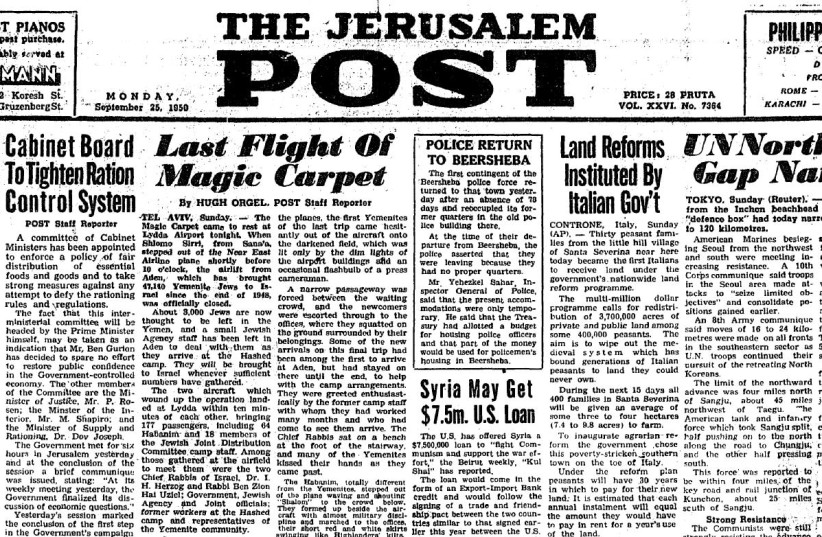The Jerusalem Post turns 90 years young this week, as it celebrates the day back in 1932 when an ardent Zionist, Gershon Agron, along with a group of other visionaries, began publishing an English-language broadsheet in pre-state Israel.
This was no small feat given the economic conditions at the time, the oppressive British occupation of the Land of Israel and surging Palestinian Arab violence and hostility.
But it was precisely those circumstances which made the paper, known back then as The Palestine Post, such a crucial force in helping to shape the narrative of the region.
Indeed, in our information-saturated age, replete with phenomena such as viral YouTube influencers and teenage TikTok stars, it is perhaps difficult to grasp the role and power that newspapers played in the pre-Internet era, not only in recording history but also in shaping it.
As a child growing up in New York, I recall looking forward each week to the arrival of The Jerusalem Post International Edition, which I quickly devoured from cover to cover as an antidote to the toxic anti-Israel bias of The New York Times.

Then, as now, the Post served as a window into Israeli society, both as a reflection of what was happening and as an attempt to edify, educate and entertain.
It is a voice amid the clamor, a source of reason regardless of whether one always agrees with its stance on various issues.
Since the dawn of the Web, forecasters have been predicting the demise of the newspaper as a vehicle of information. And while the industry has certainly taken a beating over the years, it is still very much alive and kicking, continuing to play a key role in informing the public and taking to task those in positions of power.
AS THE Post commemorates this milestone in its history, it is a timely opportunity to ponder what the function of Zionist and Jewish media can and should be in the age of cyberspace.
On the one hand, newspapers aim to be objective purveyors of the news, employing honesty and integrity in reporting on events.
And yet, is there really any human institution that can truly be said to be entirely objective, untainted by leanings and biases of one sort or another?
Doesn’t every media outlet have an agenda?
I think we all know this to be the case. One need look no further than the editorial page of any paper to get a sense of how those putting together the publication view the world.
Hence, there is nothing inherently contradictory in being a “Zionist newspaper,” one that advocates for Israel and the Jewish people while maintaining proper journalistic standards.
Moreover, I would argue that Israeli and Jewish newspapers not only have a right to defend the Jewish people and its state, but also bear a responsibility to do so. At no time in recent memory has there been so much bile and venom directed against our people. The calumnies and falsehoods hurled at the Jewish state online are breathtaking in their audacity and vilification, which is why platforms such as the Post are so important. Not only do they set the record straight, but they provide readers with an oasis of sensible and reasoned truth, something that is sorely lacking in so much online discourse nowadays.
This is not to say that newspapers are infallible. Far from it. As Oscar Wilde keenly observed, “The public have an insatiable curiosity to know everything, except what is worth knowing. Journalism, conscious of this, and having tradesman-like habits, supplies their demands.”
“The man who never looks into a newspaper is better informed than he who reads them, inasmuch as he who knows nothing is nearer to truth than he whose mind is filled with falsehoods and errors.”
Thomas Jefferson
And no less a personage than Thomas Jefferson, one of America’s founding fathers, had an even harsher view, asserting, “The man who never looks into a newspaper is better informed than he who reads them, inasmuch as he who knows nothing is nearer to truth than he whose mind is filled with falsehoods and errors.”
But I believe that Jefferson overstated his case. I prefer to think of favorite newspapers as akin to old friends. They are familiar and fun, interesting and enlightening, yet at times they can also infuriate or disappoint. But even when they do, their value far outweighs their demerits.
When God decided to create the world, He did so with words, though He most certainly did not have to. Perhaps the lesson is to remind us of the potency of words, which can make or break reputations, rouse new ways of thinking or even bring down tyrannical regimes and give birth to a new reality.
As a voice emanating from Zion, the Post has inspired Jews and non-Jews alike across the globe, connecting them to Israel however distant they might be. May it continue to fulfill this historic mission with passion and purpose, along with candor and conviction, for many more years to come.
The writer served as deputy communications director under prime minister Benjamin Netanyahu during his first term of office.
